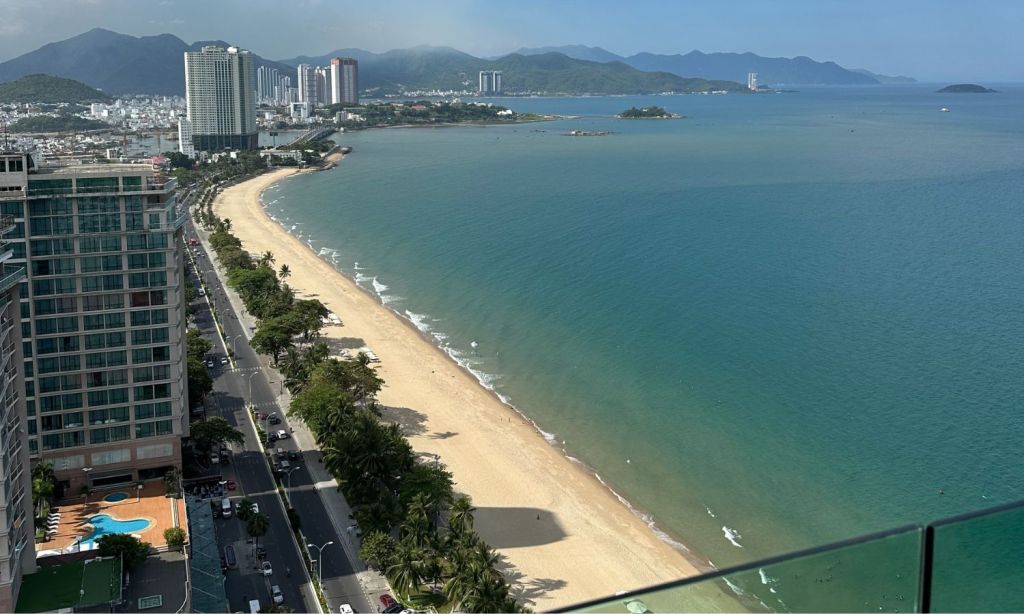“Are you still in Vietnam?,” my friend texted me. “That doesn’t look like anywhere I visited there.”
I had just posted a photo of the scenery from a rooftop I was on. The photo pictured hotel high rises along a white-sand beach and pale blue sea. It looked like a scene you might find in Maui, Hawaii — not Vietnam.
I was in Cam Ranh, a beach town in southeastern Vietnam on a peninsula enclosing Cam Ranh Bay. Despite its beauty and the fact it has an international airport, the town isn’t heavily promoted to international visitors so is mainly only visited by Vietnamese.
I spent three days swimming in its sea, taking in spectacular, pinch-me-moment sunsets and experiencing local Vietnamese culture. If you’re keen to head to Cam Ranh too and discover this Vietnam hidden gem, below I’m sharing all that I did there, along with some extra info on what I didn’t do but would recommend.
How to Get to Cam Ranh
The easiest way to get to Cam Ranh from Australia is to fly to Ho Chi Minh City (formerly Saigon) and then take another 70-minute flight to Cam Ranh.
I flew Vietjet Air (full disclosure: I visited Cam Ranh on a media trip with the airline), which flies to Ho Chi Minh City from Sydney, Melbourne and Perth. The flight from both Sydney and Melbourne to Ho Chi Min City is roughly 9 hours and 10 minutes. I did both flights in one day, but you can break it up by spending some time in Ho Chi Minh City before heading to Cam Ranh.
You can also get to Cam Ranh by train, taking it from Saigon Railway Station to Nga Ba Railway Station. It takes about 7-12 hours depending on your route. Another option is to take a sleeper bus from Saigon to Cam Ranh City. The travel time is about 7.5-8.5 hours.
What to Do in Cam Ranh
As mentioned, I swam, caught sunsets and experienced Vietnamese culture in Cam Ranh. The area is filled with resorts that have multiple pools and private white sand and clear, shallow-water beaches that give you no reason to leave.
Should you wish to explore, you could head to Nha Trang City in Cam Ranh for some sightseeing. There, you can visit Po Nagar Cham Towers, a complex of ancient Hindu templates dating back to the 7th century. The towers were dedicated to the goddess Po Nagar and offer a glimpse into the region’s Cham history and culture. You might also want to visit Nha Trang Cathedral, also known as Christ the King Cathedral, with French Gothic architecture and stained-glass windows.
Visit the Nha Trang countryside to experience rural life and try a cooking class in the old village of Phu Vinh, surrounded by rice fields. After that, you could book a sunset and dinner cruise where you can take in live music rooftop as you watch the sunset on top of a boat before heading inside it for a three-course dinner.
You might also want to embark on a snorkel tour in Nha Trang Bay. Many tours include welcome drinks, snorkel and fishing equipment followed by a barbecue dinner on board.
Where to Stay in Cam Ranh
I stayed at Movenpick Resort Cam Ranh, which is about a 30-minute drive from Nha Trang City. It had a winding resort pool, surrounded by palm trees, set against the turquoise and deep blue sea.
My balcony had a lounger that I would lie on, looking out over the pool and glittering sea below. The resort is geared towards families, with life-size characters roaming around the breakfast buffet and a giant ice cream sculpture in the lobby.
If you’re not travelling with kids, I’d recommend you opt for one of the many other resorts that line the beachfront, including the Raddison Blu Resort Cam Ranh, Alma Resort Cam Ranh or Fusion Resort Cam Ranh. The area also has hostels with rooms from AUD $30 a night.
You could also opt to stay in Nha Trang Center, though it’s more crowded and busier, whereas Cam Ranh is more of a relaxed beach town.
Related: This Elegant Hotel in Ho Chi Minh City Gives a Peek at Vietnam in the ‘30s
Related: This Village Looks Straight Out of Positano, But It’s 45 Minutes From Sydney
Read more stories from The Latch and subscribe to our email newsletter.

